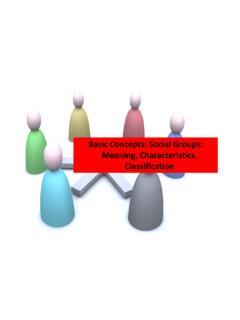Transcription of Understanding Grief - Transitions LifeCare
1 Understanding Grief Transitions GriefCare A Division of Transitions LifeCare 250 Hospice Circle, Raleigh, NC 27607 250 Hospice Circle Raleigh, NC 27607 Along The Journey of Grief Grief is often described as a journey. Just like the literal journeys we take in life, the Grief journey can be very unpredictable: we may know where we want to go, but we are not sure how to get there or what we may encounter along the way. Unlike the literal journeys we take, there is no road map for the Grief journey. We want to know what is ahead, but no guide that will tell us exactly what to expect. Grief is a uniquely individual experience. Whi le no two people grieve alike, the experiences of others may help shed some light on your own Grief journey.
2 Here is a list of some experiences that grieving people have had along the way. Some were expected, some were surprising. You may not encounter all of these, or may experience things that are not on this list. No matter what your journey of Grief looks like, know that you are not alone. You can expect: Your Grief to be surprisingly intense at times Your Grief to be surprisingly draining Your Grief to take longer than you or the people around you think it should take Your Grief to affect all aspects of your life: physical, mental, emotional, social, behavioral, spiritual Unpredictable periods of good days and bad days instead of steadily feeling less pain Grief attacks sudden waves of Grief that occur with no warning A frustrating inability to be your normal self, feeling you are going crazy A wide range of feelings, not just sadness To sometimes feel nothing, or that the death isn t real To go over and over the details leading to the death, searching for ways that you could have changed it To grieve not only for the person that you have lost.
3 But also for your lost hopes and dreams To re-examine your beliefs and priorities as you search for meaning in your changed world A sense of changed or even lost identity, wondering Who am I now? A new awareness of your own mortality Resurfacing of pain from earlier losses Resurfacing of old feelings and unresolved conflicts from the past (in yourself or in your family) Changed relationships as you discover who supports you and who doesn t Mixed feelings about memories and photos: sometimes a comfort, sometimes a too-painful reminderof what is lost Mixed feelings about happy events such as birthdays, holidays, weddings etc. Mixed feelings about moving on or being happy again Your Grief to change over time: from the intense pain of all that is lost to a grateful awareness of all thatis part of you foreverCopyright 2017 Transitions LifeCare 250 Hospice Circle Raleigh, NC 27607 Understanding Grief Grief : Is a natural human response to loss Is universal (we all grieve) but unique (we each grieve differently) Is an intense inner process causing many outer changes Affects us on all levels.
4 Physical, mental, emotional, behavioral, social, and spiritual Often leaves us feeling like we are going crazy or are losing it Is not a predictable process of required stages, but does have recognizable patterns Is a healing process, similar to physical healing from a serious injury: Recovery itself can be painful, challenging, and take longer than we expect Progress is not steady; it is normal to have both good days and bad days While we can t control/predict the process, there are ways to help our healing We must work through the pain at times and avoid the pain at other times Caring for ourselves and respecting our current limits is vital to our healing Is different with every loss and is influenced by.
5 Who you are at the time of the loss Who he/she is at the time of the loss How the death occurred Other life circumstances and stresses at the time of the loss History of relationship between you and the person who has died How you were taught to grieve Moves from painful sense of separation to a comforting sense of ongoing connectionWhat we have once enjoyed we can never lose. All that we love deeply is part of us forever. - Helen KellerCopyright 2017 Transitions LifeCare 250 Hospice Circle Raleigh, NC 27607 Normal Grief Reactions Grief is a natural human response to loss. It is often thought of as something that will get a little bit better each day, a period of sadness that must be bravely endured until it lessens with time.
6 But the truth is that Grief is an up and down process that is much more than sadness. When someone important to us dies, it affects every aspect of our being physical, mental, behavioral, and spiritual as well as emotional. Grief can cause profound changes in all these areas, and can make you feel like something is wrong with you. But in fact, something is right with you: these reactions are normal, natural responses to the loss of a significant person in your life. Emotional Sadness Anger Guilt, regret Relief Shock, numbness Yearning Anxiety, insecurity, panic, fear Apathy, lack of motivation L oneliness and sense of social isolation Resentment, envy, feeling cheated Abandonment Helplessness, lack of control Decreased self-confidence HumorPhysical Fatigue, feeling drained Feeling of emptiness or butterflies inthe stomach Lump in the throat Tightness in the chest, breathlessness Increased muscle tension, aches, pain Susceptibility to illness or exacerbation ofexisting health problems Feeling of weakness Palpitations Shaking Dryness of the mouth Over-sensitivity to noiseMental Confusion, disorientation.
7 Forgetfulness,inability to concentrate Vivid imagery of the illness and/or death Need to tell the details of the loss againand again Disbelief, unreality Sense of presence Seeing, smelling, or hearing the person Wishing for death or to join the deceased Thoughts like: It will never be the same or It s not fair Dreams of the deceasedBehavioral Sleep and appetite changes Increase in accidents or risky behaviors Searching and calling out, talking to thedeceased Crying, screaming Restlessness, sighing Irritability, feeling on edge Social withdrawal or increased socialactivity; changed relationships Changes in work performance Increase or decrease in alcohol or drug use Increase or decrease in self-careSpiritual Loss of identity, loss of purpose Search for meaning , questioning Redefining personal philosophy andassumptions about life Turning away from or towards existingbeliefs Increase or decrease in religious practice:attending worship, prayer, meditation Anger at faith, anger at God Gratitude Peace, resolution Increased meaning , hope New life prioritiesWe all grieve, but no two people grieve alike.
8 You may experience any combination of these reactions, and your responses can vary greatly from day to day. Letting yourself experience and work through them is part of the difficult but ultimately healing process of Grief . List adapted from Grief Counseling and Grief Therapy by J. William Worden and Normal Manifestations of Grief by Gerry Haynes and Kay Kukowski 250 Hospice Circle Raleigh, NC 27607 Coping with Grief Grief can be emotionally exhausting Understand that you are different right now because you are healing Be gentle and patient with yourself; treat yourself as you would a good friend Lower your expectations of what you would normally be able to manage Give yourself a pass when something is too hard Take time alone when you are too tired or too sad to be with people Seek those you can trust to support you.
9 Avoid those who are drainingGrief can be physically exhausting Try to eat regular meals, and maintain an exercise and sleep routine Take it slowly; choose activities that replenish you Allow tears, which release stress-producing chemicals as well as emotions Consider time off from work; look for ways to share the load at work and/or home Create small getaways like a hot bath, an afternoon nap, a walk outdoorsGrief can make you feel out of control Establish a routine of some kind, even if very different than before the loss Prioritize. When overwhelmed, ask: What really needs to be done today? What can wait? Set small goals and focus on living one day at a time Notice what you can do: keep a Done list as well as a To Do list, and watch it grow Make a list of strengths that have helped you face challenges in the past Write your swirling thoughts in a journal to release and bring some order to them Pour your feelings out through art: paint, collage, write a poem Try brisk physical activity.
10 Work in the yard, sweep, scrub, walk fast, work out Explore relaxation practices such as breathing, meditation, yogaGrief can be confusing to those who care about you Don t expect friends and family to be mind readers, even if they are close to you Communicate honestly instead of being strong Don t hide your tears; being open allows you to connect instead of isolate If support is being offered, allow yourself to accept help from others If support is not being offered, reach out instead of waiting in silent frustration Determine what you need and then who can help: do you need someone to help withoverwhelming tasks or a good listener to let you talk freely?






